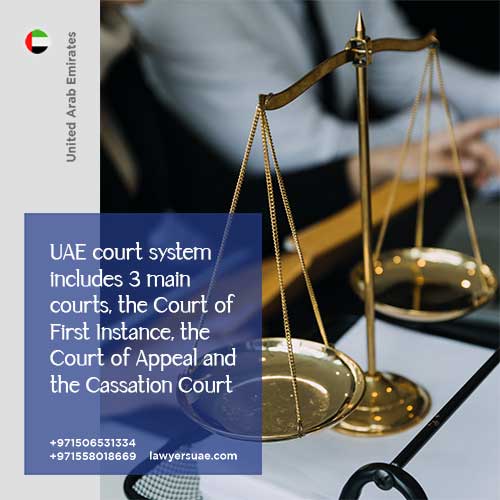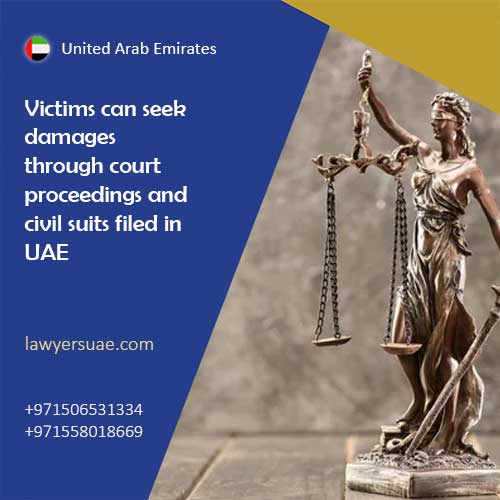The United Arab Emirates has established a comprehensive penal code that serves as the foundation for its criminal law. This legal framework plays a crucial role in maintaining law and order within the country while reflecting the cultural values and traditions of the UAE society. An understanding of the UAE’s penal code is essential for residents, visitors, and businesses operating in the nation to ensure compliance and avoid legal consequences. This article aims to provide a comprehensive guide to the criminal law of the UAE, exploring the key aspects and provisions outlined in the penal code.
What is The Main Criminal Law Governing The UAE?
The UAE Penal Code, officially known as the Federal Law No. 3 of 1987 on Issuance of the Penal Code, recently updated in 2022 with Federal Law No. 31 of 2021, is based on a combination of Sharia (Islamic law) principles and contemporary legal practices. In addition to Islamic principles, the criminal process in Dubai draws regulation from the Criminal Procedures Law No 35 of 1991. This law directs the filing of criminal complaints, criminal investigations, trial processes, judgments, and appeals.
Ny mpilalao lehibe tafiditra amin'ny fizotry ny heloka bevava ao UAE dia ny niharam-boina/mpitaraina, olona voampanga/voampanga, polisy, mpampanoa lalàna, ary ny fitsarana. Matetika dia manomboka ny fitsarana heloka bevava rehefa mametraka fitarainana momba ny voampanga any amin'ny paositry ny polisy eo an-toerana ilay niharam-boina. Andraikitry ny polisy ny manao famotorana momba ny heloka bevava, raha ny Fampanoavana no miampanga an’ilay voampanga eny amin’ny fitsarana.
Ny rafi-pitsarana UAE dia misy fitsarana lehibe telo:
- Ny Fitsarana ambaratonga voalohany: Raha vao tafapetraka dia tonga eny amin’ity fitsarana ity ny raharaha heloka bevava rehetra. Ny fitsarana dia ahitana mpitsara tokana izay mihaino ny raharaha ary manome ny didim-pitsarana. Na izany aza, mpitsara telo no mandre sy mamaritra ny raharaha amin'ny fitsarana heloka bevava (izay mitondra sazy henjana). Tsy misy fahazoan-dàlana ho an'ny fitsarana mpitsara amin'izao dingana izao.
- Ny Fitsarana Ambony: Aorian'ny famoahan'ny Fitsarana ambaratonga voalohany ny didim-pitsarany dia azon'ny andaniny sy ankilany atao ny mametraka fitoriana any amin'ny Fitsarana Ambony. Marihina fa tsy ren’ity fitsarana ity intsony ny raharaha. Tsy maintsy hamaritana ihany raha nisy ny fahadisoana tamin’ny didim-pitsarana navoakan’ny fitsarana ambany.
- Ny Fitsarana Cassation: Izay olona tsy afa-po amin'ny didim-pitsaran'ny Fitsarana Ambony dia afaka mampiakatra ny raharaha any amin'ny Fitsarana Cassation. Ny fanapahan-kevitry ny fitsarana dia farany.
Raha voaheloka noho ny heloka bevava, fahatakarana ny Fizotry ny fiampangana heloka bevava any UAE tena ilaina. Afaka manampy hamantatra ny antony hampiakatra ny didim-pitsarana na ny sazy ny mpisolovava efa za-draharaha amin'ny fitsarana ambony.
What are the key principles and provisions of the UAE’s Penal Code?
The UAE Penal Code (Federal Law No. 3 of 1987) is based on a combination of Sharia (Islamic law) principles and contemporary legal concepts. It aims to maintain law and order while preserving the cultural and religious values of the UAE society, as per the general principles outlined in Article 1.
- Principles Derived from Sharia Law
- Prohibitions on activities like gambling, alcohol consumption, illicit sexual relations
- Hudud crimes like theft and adultery have Sharia-prescribed punishments e.g. amputation, stoning
- Retributive “eye for an eye” justice for crimes like murder and bodily harm
- Contemporary Legal Principles
- Codification and standardization of laws across emirates
- Clearly defined crimes, penalties, statutory limitations
- Due process, presumption of innocence, right to counsel
- Fepetra fototra
- Crimes against state security – treason, terrorism, etc.
- Crimes against individuals – murder, assault, defamation, honor crimes
- Financial crimes – fraud, breach of trust, counterfeiting, money laundering
- Cybercrimes – hacking, online fraud, illegal content
- Public safety, moral crimes, prohibited activities
The Penal Code blends Sharia and contemporary principles, though some provisions face human rights criticism. Consulting local legal experts is recommended.
Criminal Law vs Criminal Procedure Law in the UAE
Criminal Law defines the substantive rules that establish what constitutes a crime and prescribe the punishment or penalty to be imposed for proven offenses. It is covered under the UAE Penal Code (Federal Law No. 3 of 1987).
Lafiny lehibe:
- Categories and classifications of crimes
- Elements that must be proven for an act to qualify as a crime
- The punishment or sentence corresponding to each crime
For example, the Penal Code defines murder as a criminal offense and specifies the punishment for someone convicted of murder.
Criminal Procedure Law, on the other hand, establishes the procedural rules and processes for enforcing the substantive criminal laws. It is outlined in the UAE Criminal Procedure Law (Federal Law No. 35 of 1992).
Lafiny lehibe:
- Powers and limitations of law enforcement in investigations
- Procedures for arrest, detention, and charging an accused
- Rights and protections afforded to the accused
- Conducting trials and court proceedings
- The appeals process after a judgment
For instance, it lays down rules for collecting evidence, the process of charging someone, conducting a fair trial, and the appeals mechanism.
While criminal law defines what a crime is, criminal procedure law ensures those substantive laws are implemented properly through an established judicial process, from investigation to prosecution and trials.
The former outlines legal consequences, the latter enables enforcement of those laws.
Fanasokajiana ny fandikan-dalàna sy ny heloka bevava ao amin'ny lalàna heloka bevava UAE
Alohan'ny hametrahana fitarainana momba ny heloka bevava dia ilaina ny mianatra ny karazana fandikan-dalàna sy heloka bevava eo ambanin'ny lalàna UAE. Misy karazana fandikan-dalàna telo lehibe sy ny saziny:
- Fanitsakitsahana (Violations): Ity no sokajy faran'izay henjana indrindra na fandikan-dalàna madinidinika momba ny fandikan-dalàna UAE. Tafiditra ao anatin'izy ireo izay fihetsika na fandaozana izay mahasarika sazy na sazy tsy mihoatra ny 10 andro an-tranomaizina na onitra 1,000 dirham fara-fahakeliny.
- Fanodinkodinana: A misdemeanor is punishable with confinement, a fine of 1,000 to 10,000 dirhams at most, or deportation. The offence or penalty may also attract Diyyat, fandoavana “vola amin’ny ra” silamo.
- Felonia: Ireo no heloka bevava faran'izay henjana indrindra eo ambanin'ny lalànan'ny Emira Arabo Mitambatra, ary sazy an-tranomaizina mandra-pahafaty, na fahafatesana, na Diyyat.
How Are Criminal Laws Enforced in The UAE?
Criminal laws in the UAE are enforced through the combined efforts of law enforcement agencies, the public prosecution, and the judicial system, as outlined in the UAE Criminal Procedure Law. The process typically begins with an investigation conducted by police authorities upon receiving information about a potential crime. They have the power to summon individuals, collect evidence, make arrests, and refer cases to the public prosecution.
The public prosecution then reviews the evidence and decides whether to press formal charges or dismiss the case. If charges are filed, the case proceeds to trial in the relevant court – the Court of First Instance for felonies and misdemeanors, and the Court of Misdemeanors for lesser offenses. Trials are overseen by judges who evaluate the evidence and testimonies presented by the prosecution and defense.
After the court issues a judgment, both the convicted person and the prosecution reserve the right to appeal to higher courts like the Court of Appeal and then the Court of Cassation. The enforcement of final verdicts and sentences is carried out through the police, public prosecution, and the prison system in the UAE.
What is The Process For Reporting A Crime in The UAE?
When a crime occurs in the UAE, the first step is to file a complaint with the police at the nearest station, preferably close to where the incident took place. This can be done either orally or in writing, but the complaint must clearly detail the events that constitute the alleged criminal offense.
The police will have the complainant provide their statement, which is recorded in Arabic and must be signed. Additionally, UAE law allows complainants to call witnesses who can corroborate their account and lend credibility to the allegations. Having witnesses provide supplementary context can greatly aid the subsequent criminal investigation.
Once a complaint is filed, the relevant authorities commence an investigation to verify the claims and attempt to identify and locate potential suspects. Depending on the nature of the crime, this could involve legal officers from the police, immigration officials, coast guards, municipality inspectors, border patrol, and other law enforcement agencies.
A key part of the investigation is interrogating any identified suspects and taking their statements. The suspects also have the right to present their own witnesses to support their version of events. Authorities collect and analyze all available evidence such as documents, photos/videos, forensics, and witness testimony.
If the investigation finds sufficient evidence of a criminal act, the public prosecutor then decides whether to press formal charges. If charges are filed, the case proceeds to the UAE courts as per the Criminal Procedure Law.
At this stage, those looking to pursue a criminal case against another party should take certain steps in addition to the police complaint:
- Obtain a medical report documenting any injuries
- Gather other evidence like insurance records and witness statements
- Consult an experienced criminal defense lawyer
If the prosecutor moves forward with charges, the complainant may need to file a civil lawsuit to have the criminal case heard in court.
Inona avy ireo karazana heloka bevava azo taterina?
Ireto heloka bevava manaraka ireto dia azo taterina amin'ny polisy any UAE:
- vonoan-olona
- vono olona
- fanolanana
- Fanafihana ara-pananahana
- vaky trano
- halatra
- fanodikodinam-bola
- Raharaha mifandraika amin'ny fifamoivoizana
- hosoka
- Fisandohana
- Fanitsakitsahana ny zava-mahadomelina
- Izay heloka na asa hafa mandika ny lalàna
Ho an'ny tranga mifandray amin'ny fiarovana na fanorisorenana dia azo atao ny miantso mivantana ny polisy amin'ny alàlan'ny Aman Service-ny amin'ny 8002626 na amin'ny alàlan'ny SMS amin'ny 8002828. Tranonkala polisy Abu Dhabi na any amin'ny sampana rehetra ao amin'ny Departemantan'ny Fanadihadiana Heloka Bevava (CID) any Dubai.
What Are The Procedures For Criminal Investigations And Trials in The UAE?
Criminal investigations in the UAE are governed by the Criminal Procedure Law and overseen by the public prosecution. When a crime is reported, the police and other law enforcement agencies conduct an initial investigation to gather evidence. This can involve:
- Questioning suspects, victims, and witnesses
- Collecting physical evidence, documents, recordings etc.
- Conducting searches, seizures, and forensic analysis
- Working with experts and consultants as needed
The findings are presented to the public prosecution, who reviews the evidence and decides whether to press charges or dismiss the case. The Public Prosecutor will invite and separately interview the complainant and suspect to ascertain their stories. At this stage, either party may produce witnesses to verify their account and help the Public Prosecutor determine if a charge is necessary. Statements at this stage are also made or translated into Arabic and signed by both parties. If charges are filed, the prosecution prepares the case for trial.
Criminal trials in the UAE take place in the courts under the purview of judges. The process typically involves:
- The charges being read out by the prosecution
- The defendant entering a plea of guilty or not guilty
- The prosecution and defense presenting their evidence and arguments
- Examination of witnesses from both sides
- Closing statements from prosecution and defense
The judge(s) then deliberate in private and issue a reasoned judgment – acquitting the defendant if not convinced of guilt beyond reasonable doubt or issuing a conviction and sentence if they find the defendant guilty based on the evidence.
Both the convicted person and prosecution have the right to appeal to higher courts against the judgment or sentence. The appeals courts review the case records and may uphold or overturn the lower court’s decision.
Throughout the process, certain rights such as presumption of innocence, access to legal counsel, and standards of evidence and proof must be upheld as per UAE law. Criminal courts handle cases ranging from minor offenses to serious crimes like financial fraud, cybercrimes, and violence.
Azo atao ve ny manenjika raharaha heloka bevava raha tsy hita ilay nahavanon-doza?
Eny, azo atao ny manenjika raharaha heloka bevava amin'ny tranga sasany, na dia tsy hita aza ilay nahavanon-doza. Eritrereto hoe nanangona porofo manamarina ny fomba nandratra azy ilay niharam-boina ary afaka manome antontan-taratasy mazava momba ny fotoana sy ny toerana nisehoan'ilay zava-nitranga. Amin’izay fotoana izay dia azo atao ny manenjika ny raharaha heloka bevava.
What Are The Legal Rights Of Victims Under UAE’s Criminal Law?
The UAE takes measures to protect and uphold the rights of crime victims during the legal process. Key rights afforded to victims under the UAE Criminal Procedure Law and other regulations include:
- Right to File a Criminal Complaint Victims have the right to report crimes and initiate legal proceedings against perpetrators
- Rights During Investigation
- Right to have complaints promptly and thoroughly investigated
- Right to provide evidence and witness testimony
- Right to participate in certain investigative measures
- Rights During Trial
- Right to access legal counsel and representation
- Right to attend court hearings unless excluded for reasons
- Right to review/comment on evidence submitted
- Right to Seek Damages/Compensation
- Right to claim compensation from perpetrators for damages, injuries, medical expenses and other quantifiable losses
- Victims can also seek reimbursement for travel and other expenses but not for wages/income lost due to time spent attending court proceedings
- Rights Related to Privacy, Safety and Support
- Right to have identities protected and kept confidential if required
- Right to protection measures for victims of crimes like human trafficking, violence etc.
- Access to victim support services, shelters, counseling and financial aid funds
The UAE has established mechanisms for victims to claim damages and compensation through civil lawsuits against perpetrators. Additionally, victims have the right to legal assistance and can appoint lawyers or have legal aid assigned. Support entities also provide free advice and counsel.
Overall, UAE laws aim to safeguard victims’ rights to privacy, prevent re-victimization, ensure safety, enable compensation claims, and provide rehabilitation services during the criminal justice process.
Inona no andraikitry ny mpisolovava fiarovana amin'ny raharaha heloka bevava?
Ny mpisolovava mpiaro no tompon'andraikitra amin'ny fiarovana ny meloka eo amin'ny fitsarana. Azon'izy ireo atao ny manohitra ny porofo natolotry ny mpampanoa lalàna ary miady hevitra fa tokony havotsotra ilay mpandika lalàna na hahena ny sazy.
Ireto ny sasany amin'ireo andraikitry ny mpisolovava heloka bevava amin'ny raharaha heloka bevava:
- Ny mpisolovava mpiaro dia afaka miteny amin'ny anaran'ny mpandika lalàna amin'ny fitsarana.
- Raha miafara amin'ny fanamelohana ny raharaha, dia hiara-hiasa amin'ny voampanga ny mpisolovava mba hamaritana sazy sahaza sy hametraka toe-javatra manalefaka mba hampihenana ny fanamelohana.
- Rehefa mifampiraharaha amin'ny fifampiraharahana amin'ny fampanoavana, ny mpisolovava mpiaro dia afaka manolotra tolo-kevitra amin'ny fampihenana ny sazy.
- Ny mpisolovava mpiaro no misolo tena ny voampanga amin'ny fitsarana didim-pitsarana.
Inona no anjara asan'ny porofo forensika amin'ny raharaha heloka bevava?
Ny porofo forensika dia matetika ampiasaina amin'ny raharaha heloka bevava mba hamaritana ny zava-misy amin'ny tranga iray. Mety ahitana porofo ADN, dian-tanana, porofo ballistic, ary karazana porofo ara-tsiansa hafa.
Inona no andraikitry ny polisy amin'ny raharaha heloka bevava?
Rehefa misy fitarainana dia alefan'ny polisy any amin'ny sampan-draharaha mifandraika amin'izany (sampana fitsaboana ara-pitsaboana, sampan-draharaha momba ny heloka bevava elektronika, sns.) mba hojerena.
Avy eo ny polisy dia hitondra ny fitarainana any amin'ny fampanoavana, izay hanendrena mpampanoa lalàna handinika izany araka ny fehezan-dalàna famaizana UAE.
Hanadihady ny fitoriana ihany koa ny polisy ary hanangona porofo hanohanana ny raharaha. Azon'izy ireo atao koa ny misambotra sy mitazona ilay meloka.
Inona no andraikitry ny mpampanoa lalàna amin'ny raharaha heloka bevava?
Rehefa misy fitarainana alefa any amin’ny fampanoavana, dia hisy mpampanoa lalàna hanendrena azy handinika izany. Ny fampanoavana avy eo no hanapa-kevitra na hanenjika ny raharaha na tsia. Azon'izy ireo atao koa ny misafidy ny hanajanona ilay raharaha raha tsy ampy ny porofo manohana izany.
Hiara-hiasa amin’ny mpitandro filaminana ihany koa ny mpampanoa lalàna amin’ny fanadihadiana ny fitarainana sy ny fanangonana porofo. Azon'izy ireo atao koa ny misambotra sy mitazona ilay meloka.
Inona no andraikitry ny mpisolovava ny niharam-boina amin'ny raharaha heloka bevava?
Ny mpandika lalàna iray dia mety ho voaheloka ary asaina mandoa onitra ho an'ilay niharam-boina amin'ny tranga sasany. Ny mpisolovavan'ilay niharam-boina dia hiara-hiasa amin'ny fitsarana mandritra ny fanasaziana na aoriana mba hanangonana porofo hamaritana raha manana fahaizana ara-bola hanonerana ilay niharam-boina ilay nahavanon-doza.
Ny mpisolovava an'ilay niharam-boina dia mety hisolo tena azy ireo amin'ny fitoriana sivily amin'ireo mpandika lalàna.
Raha voampanga ho nanao heloka bevava ianao, dia ilaina ny mitady tolotra mpisolovava heloka bevava. Ho afaka hanoro hevitra anao momba ny zonao izy ireo ary hisolo tena anao eo amin'ny fitsarana.
How Does The UAE’s Criminal law Handle Cases Involving Foreigners Or Visitors?
The United Arab Emirates enforces its comprehensive legal system equally on citizens and non-citizens for any criminal offenses committed within its borders. Foreign nationals, expatriate residents, and visitors are all subject to the UAE’s criminal laws and judicial processes without exception.
If accused of a crime in the UAE, foreigners will go through arrest, charges, and prosecution via the local courts where the alleged offense occurred. Proceedings are in Arabic, with translation provided if needed. The same standards of evidence, legal representation provisions, and sentencing guidelines apply regardless of one’s nationality or residency status.
It’s crucial for foreigners to understand that actions acceptable elsewhere may constitute crimes in the UAE due to differences in laws and cultural norms. Ignorance of the law does not excuse criminal behavior.
Embassies may offer consular assistance, but the UAE maintains full authority over prosecution of foreign defendants. Respecting local laws is a must for visitors and residents alike.
Moreover, foreigners should note that they may face detention during investigations, with pre-trial procedures and rights to understand. Court cases can also experience lengthy delays impacting one’s stay. Uniquely, double jeopardy principles from other nations may not apply – the UAE could retry someone for an offense they faced prosecution for elsewhere previously.
Ahoana raha any amin'ny firenena hafa ilay niharam-boina?
Raha tsy any UAE ilay niharam-boina, dia mety mbola hanome porofo hanohanana raharaha heloka bevava izy ireo. Azo atao izany amin'ny alàlan'ny fihaonambe video, fametrahana an-tserasera, ary fomba fanangonana porofo hafa.
How Can One Check The Status Of A Criminal Case Or Police Complaint in The UAE?
The method for tracking the progress of a criminal matter or police complaint filed in the United Arab Emirates varies based on the emirate where the case originated. The two most populous emirates, Dubai and Abu Dhabi, have distinct approaches.
Dubai
In Dubai, residents can utilize an online portal created by the Dubai Police force that allows case status checks by simply entering the reference number. However, if this digital service is inaccessible, alternative contact options like:
- The police call center
- karazana verinia
- Website/app live chat
Abu Dhabi
On the other hand, Abu Dhabi takes a different route by offering a dedicated case tracking service through the Abu Dhabi Judicial Department’s website. To use this, one must first register for an account using their Emirates ID number and date of birth before gaining access to view case details online.
Torohevitra ankapobeny
No matter which emirate is involved, retaining the specific case reference number is vital for any online inquiry about its status and progress.
If the digital options are unavailable or experiencing technical difficulties, directly contacting either the original police station where the complaint was filed or the judicial authorities overseeing the case can provide the necessary updates.
It’s important to note that while these online tracking services aim to increase transparency, they are still evolving systems that may encounter limitations periodically. Traditional channels of communication with law enforcement and the courts remain reliable alternatives.
How Does the UAE’s Criminal Law Handle Arbitration or Alternative Dispute Resolution?
The UAE criminal law system primarily deals with prosecution of criminal offenses through the court system. However, it does allow for arbitration and alternative dispute resolution methods in certain cases before formal charges are brought.
For minor criminal complaints, police authorities may first attempt to resolve the matter through mediation between the parties involved. If a settlement is reached, the case can be closed without proceeding to trial. This is commonly used for issues like bounced cheques, minor assaults, or other misdemeanors.
Binding arbitration is also recognized for certain civil matters that have criminal implications, such as labor disputes or commercial conflicts. An appointed arbitration panel can render a decision that is legally enforceable. But for more serious criminal allegations, the case will go through the standard prosecution channels in the UAE courts.
Why Do You Need A Local Specialized And Experienced Criminal Lawyer
Facing criminal charges in the United Arab Emirates demands specialist legal expertise that only a local, seasoned criminal lawyer can provide. The UAE’s unique legal system, blending civil and Sharia laws, requires in-depth knowledge that comes from years of experience working within its judicial processes. A lawyer based in the Emirates understands the nuances that international practitioners may overlook.
More than just comprehending the laws, a local criminal lawyer serves as an invaluable guide for navigating the UAE’s courts. They are well-versed in the protocols, procedures and dynamics of the justice system. Their linguistic proficiency in Arabic ensures accurate translation of documents and clear communication during hearings. Aspects like these can be critical advantages.
Additionally, UAE lawyers with established careers often possess connections, reputation and a deep cultural understanding – assets that can benefit a client’s case strategy. They grasp how the society’s customs and values interplay with the laws. This context informs how they construct legal defenses and negotiate for favorable resolutions with authorities.
From managing different criminal charges to handling evidence properly, a specialized local criminal lawyer has honed tactics specific to the UAE Courts. Their strategic representation draws from direct experience uniquely relevant to your situation. While all legal counsel is important when accused, having an advocate deeply ensconced in UAE criminal law can make a pivotal difference.
Na nohadihadiana ianao, na nosamborina, na voampanga ho nanao heloka bevava tany Emirà Arabo Mitambatra, dia tena ilaina ny manana mpisolovava izay mahafantatra ny lalàn'ny firenena. Ara-dalàna ny anao fifampidinihana aminay hanampy anay hahatakatra ny toe-javatra misy anao sy ny ahiahinao. Mifandraisa aminay handamina fivoriana. Antsoy izahay izao ho an Fanendrena maika sy fivoriana amin'ny +971506531334 +971558018669





